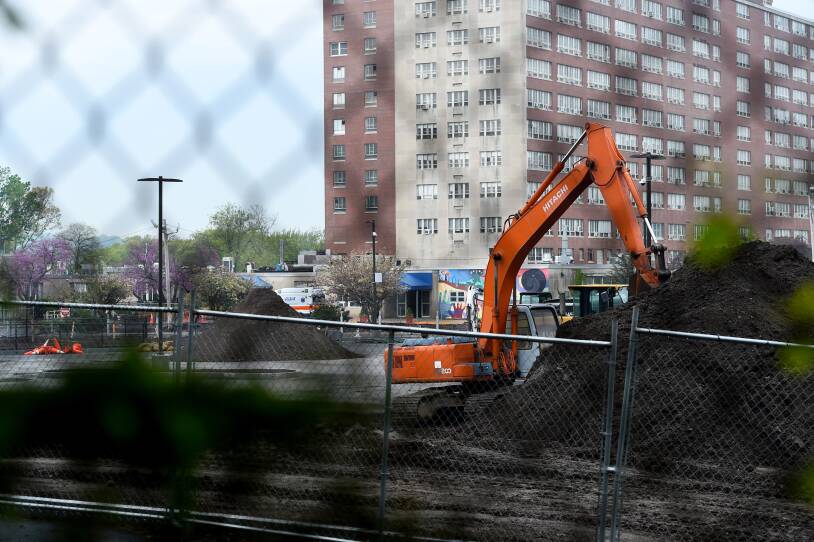Lemuel Shattuck Hospital is set to relocate its operations from the southwestern edge of Franklin Park, but the future of the state-owned land it's on is uncertain. Both state officials and park advocates see the move as an opportunity, but have conflicting ideas about what to do with the land once the hospital is gone.
Advocates are pushing for more open space, and a re-conversion of all or at least some of the Shattuck campus to park land.
"The intention of this park is really to be a respite from the outside world," said Janna Cohen-Rosenthal, executive director of the Franklin Park Coalition, one of the groups of park advocates.
Meanwhile, a state official said it is unlikely the 13-acrea Shattuck campus will be given back to the city.
"We've been clear that this is a public health asset that the commonwealth holds," Executive Office of Health and Human Services Undersecretary Lauren Peters told WGBH News.
The city of Boston gave the state the land in 1949. Boston's board of park commissioners, city council, and then-mayor James M. Curley approved the conveyance to the state, according to a deed obtained by WGBH News through a public records request. An act of the legislature sealed it for “purposes of the state department of public health.”
A transaction like that wouldn't happen today, Cohen-Rosenthal argues, "but because of where Franklin Park is situated, and the disinvestment in the community during that time, it was allowed to happen. Now we have this opportunity to heal and right a wrong."
The state, however, envisions a new set of buildings across the Shattuck campus that would house both the chronically homeless and the hard-to-site services that will not move when Shattuck relocates to the Newton Pavilion in the South End in 2021. Among the services are a methadone clinic and other behavioral health services and residential treatment programs.
"In evaluating the needs of the residents, the community and the commonwealth at whole, we've identified a strong need for additional behavioral health services," Peters said. "That is the vision that we continue to maintain. That vision is shared by many of the community members that we've engaged through the [public] process."
Health and Human Services, the Department of Public Health, and the Interagency Council on Housing and Homelessness have already received the first of two required approvals to lease two acres of the Shattuck campus to a “developer/provider of Low Threshold Housing for the chronically homeless," according to a preliminary project proposal before the state's Asset Management Board in 2017. The proposal described a target size of 75 to 100 units, but some are in favor of the state's vision for even more housing and services on the Shattuck campus.

"Boston can be a difficult place to find housing for anybody, let alone somebody who may have CORI issues, or doesn't really have much of an income," said Zack DeClerck, a person in long-term recovery and advocate on the Shattuck campus community advisory board. "I'd like to see more on the site, and I think it can be done without destroying the park."
DeClerck, 27, said 100 units would not do much to solve the need for supportive housing. Although he doesn’t have first-hand knowledge of struggling for housing in Boston, he said he sees the need through his volunteer work with Pine Street's stabilization program, and Andrew House detox center. Both programs are currently on the Shattuck campus.
"If we don't provide these services, if we don't provide this housing for these neighbors, family members, friends who are struggling with addiction in our community, our homeless problem is going to continue," he said.
"Franklin Park is pretty big and needs a lot of capital improvement as it is," he said, quickly adding that he is an enthusiastic park user.
Others, like Karen Mauney-Brodek, president of the Emerald Necklace Conservancy, insist the state restore the entire Shattuck campus to the city, and pursue other sites for such housing and services.
"This site is clearly not the best place for these uses, as it is not integrated into a community. Instead, these uses would be far better located nearer to transit and other activity areas," Mauney-Brodek argued in a letter addressed to seven state legislators and several city and state agencies last month.
At a May community advisory board meeting, Mauney-Brodek echoed the idea that the state look into acquiring land and leasing housing at the Arborway Yard, just outside of Franklin Park. The idea was quickly silenced by agency heads and several advisory board members who insisted that negotiating a deal for the state-owned land could take years — precious time for those who need housing and support.
The next public meeting about the future of the Shattuck campus is scheduled for the end of June.
Undersecretary Peters said the state is considering how to increase green and open space within the Shattuck site. One of the principles guiding the campus planning is to integrate Shattuck with Franklin Park. Exactly how that will happen remains unclear. The state is evaluating request for information responses to see who might be interested in developing the site.
Cohen-Rosenthal says she and park advocates want creative ideas centered around improving the experience for all Franklin Park users and restoring the “crown jewel” of the Boston’s Emerald Necklace park network.
"Maybe something has been used for a long time for a certain purpose, like the Shattuck campus, but we can think a little outside the box and have the experience in the park be even more enhanced," she said, looking towards the ongoing construction of a parking lot on the Shattuck campus.
This article has been updated to reflect the correct spelling of Zack DeClerck's first name. It is Zack, not Zach.





